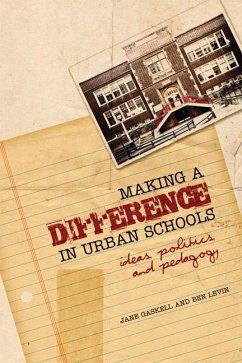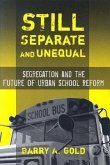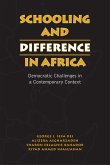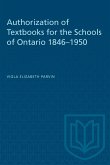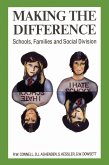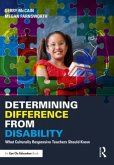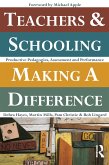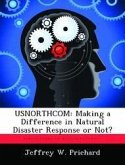- Broschiertes Buch
- Merkliste
- Auf die Merkliste
- Bewerten Bewerten
- Teilen
- Produkt teilen
- Produkterinnerung
- Produkterinnerung
Making a Difference in Urban Schools evaluates how school and community leaders have worked to change urban education in Canada for the better over the past fifty years.
Andere Kunden interessierten sich auch für
![Still Separate and Unequal: Segregation and the Future of Urban School Reform Still Separate and Unequal: Segregation and the Future of Urban School Reform]() Barry A. GoldStill Separate and Unequal: Segregation and the Future of Urban School Reform34,99 €
Barry A. GoldStill Separate and Unequal: Segregation and the Future of Urban School Reform34,99 €![Schooling and Difference in Africa Schooling and Difference in Africa]() Alireza AsgharzadehSchooling and Difference in Africa71,99 €
Alireza AsgharzadehSchooling and Difference in Africa71,99 €![Authorization of Textbooks for the Schools of Ontario 1846-1950 Authorization of Textbooks for the Schools of Ontario 1846-1950]() Viola Elizabeth ParvinAuthorization of Textbooks for the Schools of Ontario 1846-195036,99 €
Viola Elizabeth ParvinAuthorization of Textbooks for the Schools of Ontario 1846-195036,99 €![Making the Difference Making the Difference]() Rw ConnellMaking the Difference60,99 €
Rw ConnellMaking the Difference60,99 €![Determining Difference from Disability Determining Difference from Disability]() Gerry McCainDetermining Difference from Disability46,99 €
Gerry McCainDetermining Difference from Disability46,99 €![Teachers and Schooling Making A Difference Teachers and Schooling Making A Difference]() Debra HayesTeachers and Schooling Making A Difference43,99 €
Debra HayesTeachers and Schooling Making A Difference43,99 €![Usnorthcom: Making a Difference in Natural Disaster Response or Not? Usnorthcom: Making a Difference in Natural Disaster Response or Not?]() Jeffrey W. PrichardUsnorthcom: Making a Difference in Natural Disaster Response or Not?64,99 €
Jeffrey W. PrichardUsnorthcom: Making a Difference in Natural Disaster Response or Not?64,99 €-
-
-
Making a Difference in Urban Schools evaluates how school and community leaders have worked to change urban education in Canada for the better over the past fifty years.
Hinweis: Dieser Artikel kann nur an eine deutsche Lieferadresse ausgeliefert werden.
Hinweis: Dieser Artikel kann nur an eine deutsche Lieferadresse ausgeliefert werden.
Produktdetails
- Produktdetails
- Verlag: University of Toronto Press
- Seitenzahl: 232
- Erscheinungstermin: 8. August 2012
- Englisch
- Abmessung: 226mm x 152mm x 15mm
- Gewicht: 340g
- ISBN-13: 9780802095817
- ISBN-10: 080209581X
- Artikelnr.: 36174557
- Herstellerkennzeichnung
- Produktsicherheitsverantwortliche/r
- Europaallee 1
- 36244 Bad Hersfeld
- gpsr@libri.de
- Verlag: University of Toronto Press
- Seitenzahl: 232
- Erscheinungstermin: 8. August 2012
- Englisch
- Abmessung: 226mm x 152mm x 15mm
- Gewicht: 340g
- ISBN-13: 9780802095817
- ISBN-10: 080209581X
- Artikelnr.: 36174557
- Herstellerkennzeichnung
- Produktsicherheitsverantwortliche/r
- Europaallee 1
- 36244 Bad Hersfeld
- gpsr@libri.de
Jane Gaskell is a professor in the Department of Theory and Policy Studies in Education and former dean of the Ontario Institute for Studies in Education, University of Toronto.
Introduction
Chapter 1- Setting the stage: Poverty, diversity and urban education
1. Demographic challenge and change
* Poverty
* Diversity
2. The changing meaning of equity
3. The literature on urban educational systems
4. Conclusions
Chapter Two – Change in the Winnipeg School Board
Chapter Three - Reform at the Toronto Board of Education
5. The Toronto Board of Education
6. The 1970's: setting an agenda for reform
* Some of the Toronto reform trustees
7. The 1980s: institutionalizing change
8. Conclusions
Chapter Four – Ideas Matter: The Impact of Evidence and Belief
9. How do ideas matter?
10. Social movements and evidence informed policy
11. Frameworks for thinking about education and equity
12. Educational analysis in the Toronto and Winnipeg boards
* Ideas as a resource for change in Toronto
* Ideas as a resource for change in Winnipeg
13. Conclusions
Chapter five - Politics, conflict and civic capacity
* Central and local: Relationships between districts and provincial
governments
* Trustees and boards
* Community involvement
* Relations with board administrators
* Conclusions
Chapter 6 - Teaching and Learning in Urban Schools
* Creating a welcoming classroom environment
* Changing the curriculum
* Rethinking literacy
* Streaming and secondary school change
* Testing and assessment
* Relationships with teachers and their unions
* Conclusions
Chapter 7 - Lessons from Canadian urban school reform
14. Have things improved over the last forty years?
15. Policy proposals and their limits Ideas and research
16. Politics
17. Teaching and learning
18. What should be done?
* School districts need thoughtful strategic plans
* Stronger links are needed between urban districts and provincial
governments
* More public debate based on good data around the political
controversies inherent in urban public education.
* Urban schools must be good places to work and learn so as to attract
and retain good people
* A central and sustained focus on improved teaching and learning
* Strong, consistent community engagement
* Better use of research and evidence
* The necessary infrastructure to support all of the above
Appendix on methodology
* The study
Index of Names and Organizations
References
Chapter 1- Setting the stage: Poverty, diversity and urban education
1. Demographic challenge and change
* Poverty
* Diversity
2. The changing meaning of equity
3. The literature on urban educational systems
4. Conclusions
Chapter Two – Change in the Winnipeg School Board
Chapter Three - Reform at the Toronto Board of Education
5. The Toronto Board of Education
6. The 1970's: setting an agenda for reform
* Some of the Toronto reform trustees
7. The 1980s: institutionalizing change
8. Conclusions
Chapter Four – Ideas Matter: The Impact of Evidence and Belief
9. How do ideas matter?
10. Social movements and evidence informed policy
11. Frameworks for thinking about education and equity
12. Educational analysis in the Toronto and Winnipeg boards
* Ideas as a resource for change in Toronto
* Ideas as a resource for change in Winnipeg
13. Conclusions
Chapter five - Politics, conflict and civic capacity
* Central and local: Relationships between districts and provincial
governments
* Trustees and boards
* Community involvement
* Relations with board administrators
* Conclusions
Chapter 6 - Teaching and Learning in Urban Schools
* Creating a welcoming classroom environment
* Changing the curriculum
* Rethinking literacy
* Streaming and secondary school change
* Testing and assessment
* Relationships with teachers and their unions
* Conclusions
Chapter 7 - Lessons from Canadian urban school reform
14. Have things improved over the last forty years?
15. Policy proposals and their limits Ideas and research
16. Politics
17. Teaching and learning
18. What should be done?
* School districts need thoughtful strategic plans
* Stronger links are needed between urban districts and provincial
governments
* More public debate based on good data around the political
controversies inherent in urban public education.
* Urban schools must be good places to work and learn so as to attract
and retain good people
* A central and sustained focus on improved teaching and learning
* Strong, consistent community engagement
* Better use of research and evidence
* The necessary infrastructure to support all of the above
Appendix on methodology
* The study
Index of Names and Organizations
References
Introduction
Chapter 1- Setting the stage: Poverty, diversity and urban education
1. Demographic challenge and change
* Poverty
* Diversity
2. The changing meaning of equity
3. The literature on urban educational systems
4. Conclusions
Chapter Two – Change in the Winnipeg School Board
Chapter Three - Reform at the Toronto Board of Education
5. The Toronto Board of Education
6. The 1970's: setting an agenda for reform
* Some of the Toronto reform trustees
7. The 1980s: institutionalizing change
8. Conclusions
Chapter Four – Ideas Matter: The Impact of Evidence and Belief
9. How do ideas matter?
10. Social movements and evidence informed policy
11. Frameworks for thinking about education and equity
12. Educational analysis in the Toronto and Winnipeg boards
* Ideas as a resource for change in Toronto
* Ideas as a resource for change in Winnipeg
13. Conclusions
Chapter five - Politics, conflict and civic capacity
* Central and local: Relationships between districts and provincial
governments
* Trustees and boards
* Community involvement
* Relations with board administrators
* Conclusions
Chapter 6 - Teaching and Learning in Urban Schools
* Creating a welcoming classroom environment
* Changing the curriculum
* Rethinking literacy
* Streaming and secondary school change
* Testing and assessment
* Relationships with teachers and their unions
* Conclusions
Chapter 7 - Lessons from Canadian urban school reform
14. Have things improved over the last forty years?
15. Policy proposals and their limits Ideas and research
16. Politics
17. Teaching and learning
18. What should be done?
* School districts need thoughtful strategic plans
* Stronger links are needed between urban districts and provincial
governments
* More public debate based on good data around the political
controversies inherent in urban public education.
* Urban schools must be good places to work and learn so as to attract
and retain good people
* A central and sustained focus on improved teaching and learning
* Strong, consistent community engagement
* Better use of research and evidence
* The necessary infrastructure to support all of the above
Appendix on methodology
* The study
Index of Names and Organizations
References
Chapter 1- Setting the stage: Poverty, diversity and urban education
1. Demographic challenge and change
* Poverty
* Diversity
2. The changing meaning of equity
3. The literature on urban educational systems
4. Conclusions
Chapter Two – Change in the Winnipeg School Board
Chapter Three - Reform at the Toronto Board of Education
5. The Toronto Board of Education
6. The 1970's: setting an agenda for reform
* Some of the Toronto reform trustees
7. The 1980s: institutionalizing change
8. Conclusions
Chapter Four – Ideas Matter: The Impact of Evidence and Belief
9. How do ideas matter?
10. Social movements and evidence informed policy
11. Frameworks for thinking about education and equity
12. Educational analysis in the Toronto and Winnipeg boards
* Ideas as a resource for change in Toronto
* Ideas as a resource for change in Winnipeg
13. Conclusions
Chapter five - Politics, conflict and civic capacity
* Central and local: Relationships between districts and provincial
governments
* Trustees and boards
* Community involvement
* Relations with board administrators
* Conclusions
Chapter 6 - Teaching and Learning in Urban Schools
* Creating a welcoming classroom environment
* Changing the curriculum
* Rethinking literacy
* Streaming and secondary school change
* Testing and assessment
* Relationships with teachers and their unions
* Conclusions
Chapter 7 - Lessons from Canadian urban school reform
14. Have things improved over the last forty years?
15. Policy proposals and their limits Ideas and research
16. Politics
17. Teaching and learning
18. What should be done?
* School districts need thoughtful strategic plans
* Stronger links are needed between urban districts and provincial
governments
* More public debate based on good data around the political
controversies inherent in urban public education.
* Urban schools must be good places to work and learn so as to attract
and retain good people
* A central and sustained focus on improved teaching and learning
* Strong, consistent community engagement
* Better use of research and evidence
* The necessary infrastructure to support all of the above
Appendix on methodology
* The study
Index of Names and Organizations
References

